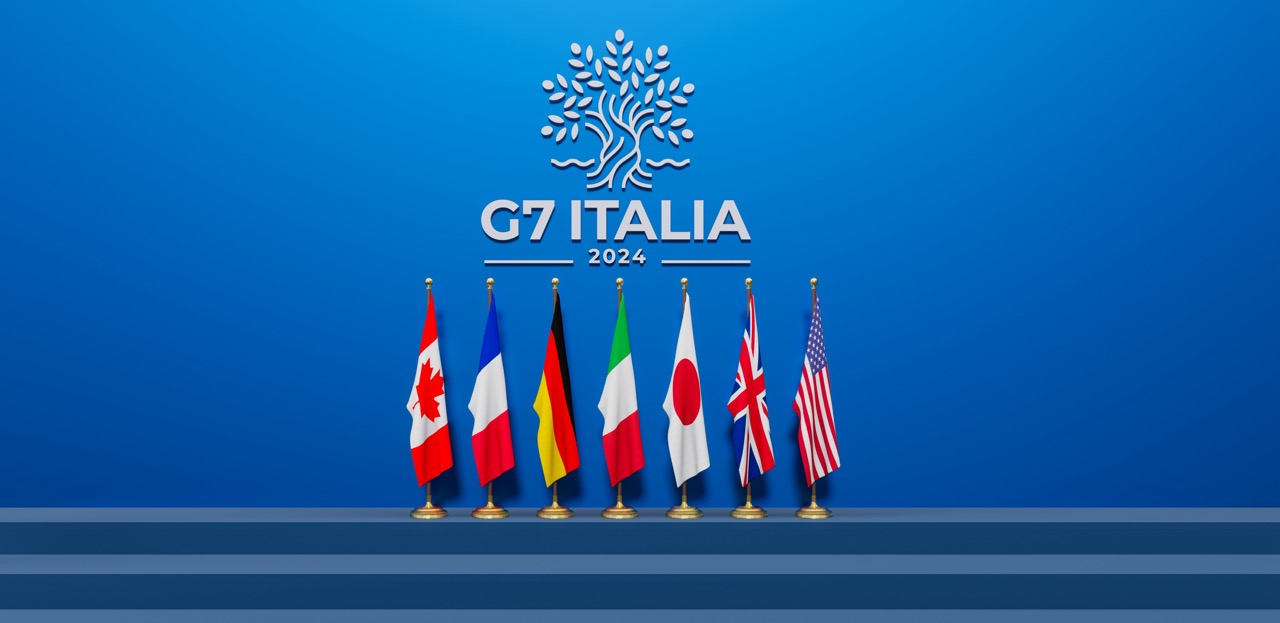G7 compliance with Apulia’s commitments among evolving priorities
Amid leadership changes and a shifting global environment in the months leading up to the Kananaskis Summit, G7 members’ compliance with the commitments their leaders made at the 2024 Apulia Summit remains uncertain, although by December it was strong. As we look ahead, compliance on migration is expected to increase, while development and gender compliance are expected to decrease.
Apulia compliance
Last June, in Italy, G7 leaders agreed to 469 commitments across crucial areas for global and domestic governance. The G7 confronted an increasingly dangerous world, with conflicts raging in Europe, the Middle East and Africa, instability in Haiti, and rising tensions over the South China Sea.
Those commitments reflected these realities. The share of commitments on regional security surged from 10% in 2023 to 14% in 2024, its highest level since 2013 (although not surpassing 2010’s 19%). G7 leaders also addressed the transnational nature of modern challenges, as energy, infrastructure and climate commitments prioritised development. Other commitments prioritised global sustainability and climate goals.
The G7 Research Group selected 20 priority commitments that best represent the total of 469 made at the Apulia Summit, encompassing the key focus areas outlined by Italy’s presidency. The selection includes three commitments on regional security and two each on energy, migration and the digital economy. One each was chosen on trade, development, gender, health, environment, food and agriculture, cybersecurity, non-proliferation, macroeconomics, climate change, labour and employment, and infrastructure.
The interim analysis assessed G7 members’ compliance from the end of the Apulia Summit on 15 June 2024, when the commitments were made, to 20 December 2024, midway to the G7 Kananaskis Summit on 15–17 June 2025. Tracking continues for the final report, to be published in early June, covering the full period between the two summits.
By 20 December, average compliance with the Apulia commitments was 88%, down 3% from the G7’s interim compliance following the 2023 Hiroshima Summit. This 88% exceeds the 85% interim scores from the 2022 Elmau and 2021 Cornwall summits but remains below the 93% interim compliance peak from the 2020 US-hosted virtual summit, narrowly focused on the Covid-19 pandemic.
By subject, six Apulia commitments had full compliance (100%) by December: those on clean energy in developing countries, financial solutions for forest protection, the Partnership for Global Infrastructure and Investment, financial and price stability, extraordinary revenue acceleration loans to Ukraine, and Israel and Palestine. Commitments on cybersecurity, decarbonising the power sector, gender, health, border management, non-proliferation and trade followed closely at 94%. Commitments on military assistance to Ukraine (88%), artificial intelligence (88%), labour (81%), closing digital divides (75%) and preventing migrant smuggling and trafficking (69%) followed. All commitments exceeded 50% compliance, but action on both climate adaptation and global food security was only 56%.
By member, the European Union ranked first with 98% compliance, followed by the United Kingdom and United States at 95%, and 2025 host Canada at 90%. These members were followed by Germany at 88%, 2024 host Italy at 85%, France at 80% and Japan at 78%.
G7 prospects
For the past four summits, final compliance scores rose 4% above the interim scores, finishing at or above 90%. Final compliance for Apulia will likely vary by subject, as global events and domestic political pressures affect members’ action. Continued compliance will also rely on leaders carrying the torch on commitments made by their predecessors: only three of the nine leaders at Apulia – Italy’s Giorgia Meloni, France’s Emmanuel Macron and the European Commission’s Ursula von der Leyen – will return to the summit table. The other two-thirds of the G7’s leadership departed their posts, making way for six new faces to bring their interests to Kananaskis. Three of those changes occurred after the interim compliance period, increasing uncertainty about compliance as member priorities shift accordingly.
Germany’s new coalition government aligns well with the Apulia host’s vision on migration, and border security has risen in importance across North America. As a result, action on migration will likely increase, fulfilling Apulia commitments and shaping the 2025 communiqué.
Aside from migration, US president Donald Trump has already proven significantly more disruptive to traditional G7 diplomacy than he was in his first term, as unprecedented cuts to overseas funding raise G7 compliance challenges. Kananaskis host Canada held a snap election less than 50 days before the summit. Agenda-shaping hosts heavily influence G7 summits, but the US will attempt to make its voice the loudest on contested issues. Trade, for example, was the second most prominent commitment area in Apulia (11%). Differing views on trade fairness will bring the issue to the fore in Kananaskis, although agreement may prove elusive.












